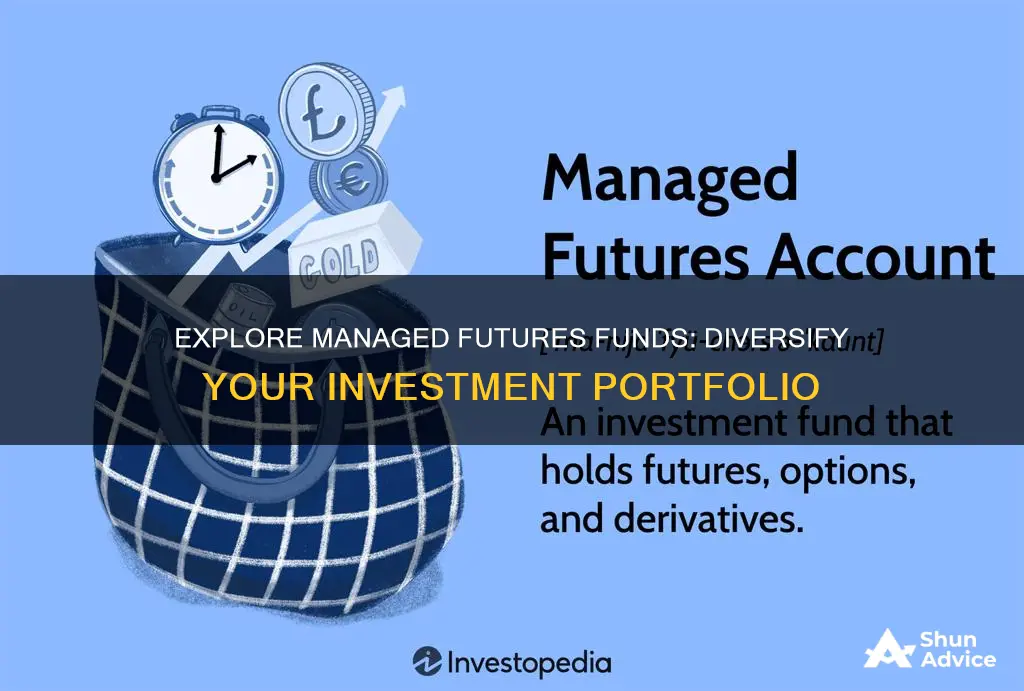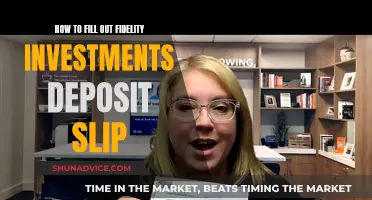
Managed futures funds are a type of alternative investment strategy used by large funds and institutional investors to achieve both portfolio and market diversification. Managed futures funds are operated by commodity pool operators (CPOs) and commodity trading advisors (CTAs) or, in some cases, commodity pool operators (CPOs). These funds are actively managed by professionals and consist of a portfolio of futures contracts. Managed futures funds can be ideal risk management tools as they are diversified, highly flexible, liquid, and transparent, with the potential to profit from rising and falling markets.
| Characteristics | Values |
|---|---|
| Type of Investment | Alternative Investment |
| Management | Managed by professionals, such as Commodity Trading Advisors (CTAs) or Commodity Pool Operators (CPOs) |
| Investment Type | Portfolio of futures contracts |
| Benefits | Reducing risk and diversification |
| Performance | Weakly or inversely correlated with traditional stock and bond markets |
| Market | Exposure to a number of markets such as commodities, energy, agriculture, and currency |
| Trading Strategies | Market-neutral strategy and trend-following strategy |
| Market-Neutral Strategy | Profit from spreads and arbitrage created by mispricing |
| Trend-Following Strategy | Profit by going long or short according to fundamentals or technical market signals |
| Growth | The managed futures industry has grown over the years, with Assets Under Management (AUM) topping $348 billion |
What You'll Learn

Managed futures funds are a type of hedge fund strategy
The primary benefit of managed futures funds is diversification. By investing in a portfolio of futures contracts, CTAs can provide exposure to various asset classes such as fixed-income futures, stock index futures, commodity futures, and foreign currency futures. This diversification helps to mitigate portfolio risk and is often used as an alternative to traditional hedge funds. The performance of managed futures is also weakly or inversely correlated with traditional stock and bond markets, making them ideal for rounding out an investment portfolio.
Another advantage of managed futures funds is their flexibility. CTAs can employ various strategies, including trend-following and market-neutral approaches, to profit from both rising and falling markets. This flexibility allows managed futures to adapt to changing market conditions and capitalise on market trends.
In addition, managed futures funds offer liquidity and transparency. They trade in highly liquid, regulated, exchange-traded instruments and foreign exchange markets, providing investors with the ability to enter and exit positions quickly. The intraday market-based pricing of these instruments also ensures transparency in the investment process.
However, it is important to consider the fees associated with managed futures funds. CTAs charge transaction and management fees that can impact net returns, especially when compared to less risky investments. Additionally, the success of managed futures funds is heavily dependent on the performance of the CTA, and their strategies may not always yield positive results.
Overall, managed futures funds offer a unique set of characteristics that can be advantageous for investors seeking diversification, flexibility, and exposure to global markets.
Actively Managed Funds: Why They're Worth Your Investment
You may want to see also

They are a way to diversify your portfolio
Managed futures funds are a way to diversify your portfolio. They are a type of alternative investment strategy used by large funds and institutional investors to achieve both portfolio and market diversification. Managed futures funds are often used as an alternative to traditional hedge funds, which have been seen as providing cover during market turmoil.
Managed futures funds are highly flexible and can be traded in over 150 financial and commodity markets worldwide, including agricultural products, metals, energy products, equities, currencies, and stock indexes. This allows investors to profit from a wide variety of non-correlated markets.
The funds can take both long and short positions in futures contracts and options on futures contracts in the global commodity, interest rate, equity, and currency markets. This gives them the ability to generate investment gains in rising or falling market environments, referred to as non-directionality.
Managed futures funds also offer diversification across a variety of active investment approaches, sectors traded, and trade durations. A multi-manager approach can provide investors with diversified access to managed futures and an overall return representative of the managed futures investment class.
Additionally, managed futures funds can be traded using various strategies, the most common being trend following. Trend following involves buying in markets that are trending higher and selling short in markets that are trending lower. Other strategies include market-neutral strategies, discretionary strategies, fundamental strategies, option writing, pattern recognition, and arbitrage strategies.
Vanguard Index Funds: Best Bets for Your Money
You may want to see also

They are a good investment during inflationary periods
Managed futures funds are a good investment during inflationary periods. This is because they are a type of alternative investment that can provide a counterbalance to losses in the equity and bond markets during such times.
Managed futures funds are a good way to diversify your portfolio and reduce risk. They are actively managed by professionals, often known as Commodity Trading Advisors (CTAs), and consist of a portfolio of futures contracts. CTAs can employ a variety of strategies, but the most common is trend following. This involves buying in markets that are trending higher and selling short in markets that are trending lower.
During inflationary periods, CTAs can focus on specific commodities or foreign currencies that can hedge against the impact of inflation on traditional equities and bonds. This ability to dynamically enter long or short positions across various markets is known as non-directionality and is a key advantage of managed futures funds.
Another benefit of managed futures funds is their weak correlation to traditional asset classes like stocks and bonds. This lack of correlation strengthens the portfolio by reducing volatility and risk without significantly impacting returns. This is particularly valuable during inflationary periods when the equity and bond markets may be more vulnerable to losses.
The growth of the managed futures industry, with assets under management (AUM) topping $348 billion, demonstrates the increasing investor awareness and confidence in this type of investment strategy.
Thailand's Climate Investment Funds: A Historical Overview
You may want to see also

They are regulated by the Commodity Futures Trading Commission
Managed futures funds are regulated by the Commodity Futures Trading Commission (CFTC) and the National Futures Association (NFA). The CFTC was established in 1974 under the Commodity Futures Trading Commission Act. The Act also led to the recognition of a new group of money managers, including Commodity Trading Advisors (CTAs) and Commodity Pool Operators (CPOs). These professionals are responsible for actively managing client assets and are subject to strict regulatory requirements.
The CFTC and the NFA conduct audits and ensure that CTAs and CPOs meet quarterly reporting requirements. This includes the submission of rigorous disclosure documents and independently audited financial statements. The heavy regulation of the industry provides investors with added protection and confidence. It also sets managed futures funds apart from hedge funds, which are often less regulated, particularly when they are based offshore.
The regulatory framework for managed futures funds helps to ensure the protection of investor interests. It promotes transparency, accountability, and compliance with legal and ethical standards. The disclosure documents provided by CTAs and CPOs offer investors detailed information about the trading strategies, fees, and performance of the funds. This enables investors to make informed decisions and assess the suitability of these investments for their portfolios.
The regulation of managed futures funds by the CFTC and the NFA contributes to the overall integrity and stability of the financial industry. It helps to mitigate risks, ensure fair practices, and foster confidence among investors. The regulatory framework also allows for the resolution of disputes and provides recourse for investors in the event of any issues or non-compliance by the fund operators.
Unlocking Opportunities: Investing in VC Funds
You may want to see also

They can be traded in over 150 markets worldwide
Managed futures funds can be traded in over 150 markets worldwide, including financial and commodity markets. This includes markets for agricultural products, metals, energy products, equities, currencies, and stock indexes.
The ability to trade in so many markets is a key advantage of managed futures funds. It allows investors to diversify their portfolios and limit their risk. This diversification is especially valuable during challenging economic periods, such as inflationary periods, when traditional equities and bonds may suffer losses.
The wide range of markets that managed futures funds can be traded in also allows investors to profit from a variety of non-correlated markets. This is because managed futures funds are non-directional, meaning they can profit from increasing or decreasing values without restriction. This is in contrast to traditional investments such as stocks and bonds, which tend to be directional and are therefore more vulnerable to market volatility.
The large number of markets that managed futures funds can be traded in also enables investors to take advantage of global opportunities and potentially increase their returns. It also helps to ensure that investors can access a range of liquid and transparent markets, which can provide greater flexibility and security when managing their investments.
Lumpsum Mutual Fund Investment: Timing for Maximum Returns
You may want to see also
Frequently asked questions
Managed futures funds are a type of alternative investment in which trading in the futures markets is managed by another person or entity, rather than the fund's owner.
Managed futures funds are ideal for portfolio and market diversification. They are highly flexible, liquid, and transparent, and they can profit from rising and falling markets.
Managed futures funds are operated by commodity pool operators (CPOs) and commodity trading advisors (CTAs). They can take both long and short positions in futures contracts and options on futures contracts in the global commodity, interest rate, equity, and currency markets.
Managed futures funds have the potential to lower overall portfolio risk and increase returns. They have historically performed well and provided excellent downside protection during adverse market conditions.
Managed futures funds have high fees. They also tend to depend on clear market trends, manager performance, and the ability to generate investment gains in rising or falling markets.







